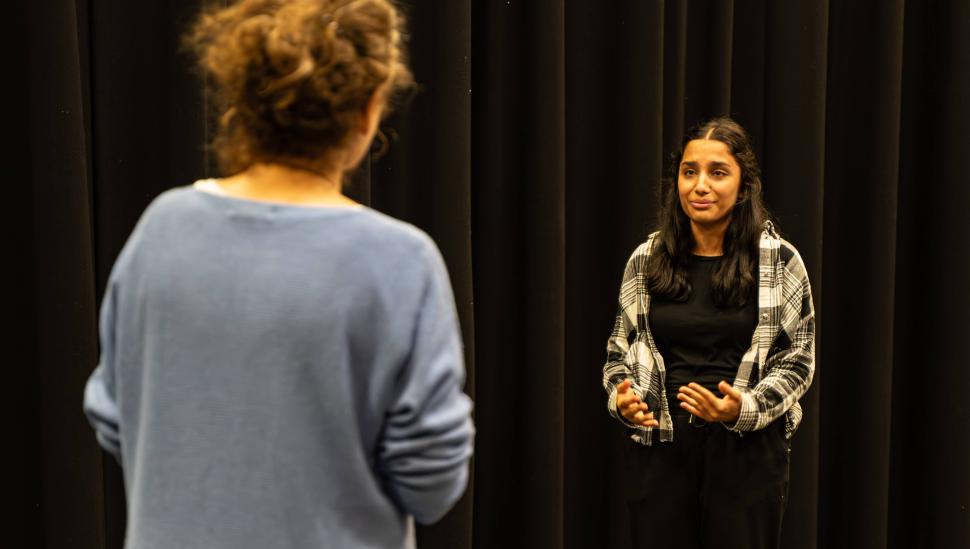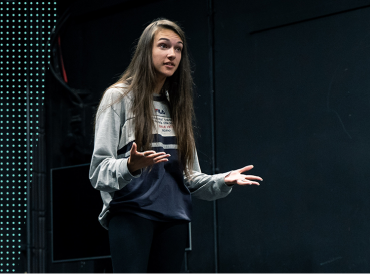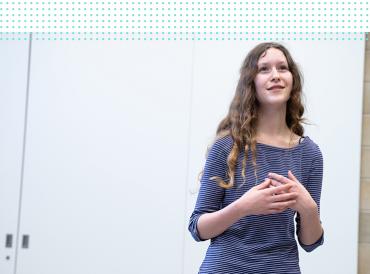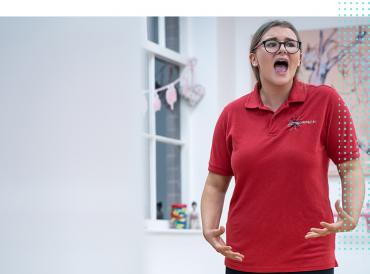Graded Exams for Performance: Acting

About the exam
Our Acting Exam learners develop their vocal, physical and interpretive skills while they delve into characters and explore the background of dramatic texts. Alongside producing authentic performances of their chosen scenes, they also gain an understanding of the context and characters within them.
Working through the grades takes our learners through the development of clear speaking and character portrayal to an understanding of a playwright’s style, the influence of theatre practitioners such as Stanislavski and a sensitive appreciation of subtext.
Learners can take their exam in a solo, duologue or combined format. The combined format is available for Level 1 and 2 Exams only.
- Solo: one learner delivers two monologues on their own (three monologues for Grades 7 and 8)
- Duologue: two learners perform two duologues (three duologues for Grade 7 and 8)
- Combined: two learners perform one monologue each and one duologue together (three scenes in total).
All Solo Acting exams are available online.
LAMDA is recognised to award qualifications on the Regulated Qualifications Framework (RQF) in England by the Office of Qualifications and Examinations Regulation (Ofqual), in Wales by Qualifications Wales (QiW), and in Northern Ireland by the Council for the Curriculum, Examinations and Assessment (CCEA).
What does the exam involve?
Type of exam: Solo or Duologue
Time allowance: Solo: 10 minutes, Duologue: 15 minutes
- Performing one own choice scene from memory
- Answering questions related to their performance
Please see the syllabus for full details.
Type of exam: Solo, Duologue or Combined
Time allowance: Solo: 15 minutes, Duologue: 25 minutes, Combined: 25 minutes
- Perform one set scene and one own choice scene from memory
- Answering questions related to their performances
Please see the LAMDA Performance Graded Examinations Syllabus (2024) for full details.
Type of exam: Solo, Duologue or Combined
Time allowance: Solo: 20 minutes, Duologue: 35 minutes, Combined: 35 minutes
- Performing one set scene and one own choice scene from memory
- Answering questions related to their performances
Please see the LAMDA Performance Graded Examinations Syllabus (2024) for full details.
Type of exam: Solo or Duologue
Time allowance:
Grade 6: Solo: 25 minutes, Duologue: 40 minutes
Grade 7: Solo: 30 minutes, Duologue: 45 minutes
Grade 8: Solo: 30 minutes, Duologue: 50 minutes
- Performing two own choice scenes at Grade 6 and three scenes at Grades 7 and 8. Scenes must be selected from a published play or television/film screenplay, within specified time periods
- Answering questions related to their performance
Please see the LAMDA Performance Graded Examinations Syllabus (2024).
Requirements
Full details of the requirements, assessment criteria and regulations for each grade can be found in the LAMDA Performance Graded Examinations Syllabus.
2024 (in effect for examinations from 1 August 2024)
As part of the 2024 Syllabus update, Learners are able to perform all pieces in the new Acting Anthology Volume 5 and previous Acting Anthology Volume 4, and all pieces in the new Verse and Prose Anthology Volume 20 and Verse and Prose Anthology Volume 19, for first assessment from 1 August 2024.
Resources & Teaching Materials
Explore our FAQs to find out more about our syllabi and qualifications.
All our syllabi listed below are available for free via download, or you can purchase our full range of publications from our online shop.
You will need:
- Performance Syllabus from August 2024
- Acting Anthology Volume 4 or Volume 5
These might also be useful:
- Teacher support material for graded examinations in performance, which can be found in our Download Centre
- Knowledge Matters Volume 3
- Monologues for Young Actors (Grade 5 and below)
- Acting Anthology Volume 3
The list of set pieces for each Exam can be found in the corresponding syllabi for each exam. You can download the syllabi as a free pdf via our Download Centre or visit our online shop.
We are unable to verify the suitability of own choice pieces, please refer to the Exam Content and Assessment and Grading Criteria detailed for the exam subject and grade entered.







